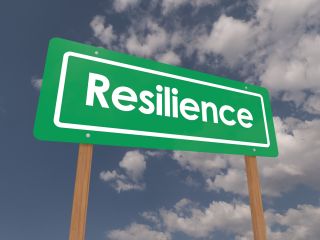Resilience
How To Become More Resilient
Resiliency can be considered a healthy choice and lifestyle.
Posted July 22, 2015
Over the years many people have often called me resilient. Whether it’s bouncing back from the loss of a loved one or overcoming a life obstacle such as cancer, my style is to just do what I have to do and then move on. In actuality, this is not a conscious decision, but rather, it’s a way of living. It’s a choice and a lifestyle.
Over the past few years, the word resilient has been appearing in my reading material—for example, in Richard Davidson’s book The Emotional Life of Your Brain—as well as in a New York Times article by Andrew Zolli titled “Learning to Bounce Back.” In view of many of the world’s tragedies and difficulties, resilience has become an important addition to a healthy worldview.
In his article, Zolli claimed that our world has become more and more out of balance, and he mentioned the idea of a broad-spectrum agenda to instill us all with more “flexibility, intelligence and responsiveness to extreme events.” He discussed the idea of “resilient thinking” and how urban planners might use the concept to update antiquated infrastructures, such as New York City’s subway system. Further, he stated that training regimes have been formulated, based in contemplative practice, to help individuals and groups become more resilient. However, he argued that if we’re resilient, and adaptive to unwanted changes, then we might not be giving responsibility to those who might have caused a particular problem in the first place.
This leads me to the idea of prevention, which is always good policy, whether it pertains to health concerns or building codes. Often we tend to be reactive rather than preventive. We may only begin taking care of ourselves when we’re confronted with a particular diagnosis or health issue, or when a security breach impinges on us, such as in the case of 911. Perhaps this is human nature, but do all these warnings suggest that we should change our way of thinking? Is there an overarching message? My sense is that when failures are properly understood then there’s a context for learning and growth. Paradoxically, some of the most resilient situations or places are those which are regularly exposed to some sort of disruption. The reason is that they carry the shared memory that, in fact, things can and do go wrong. Is that why New York City has had a few major disruptions in the past decade or so? And is that why Harold Kushner’s book of a few decades ago, When Bad Things Happen to Good People, holds so much truth?
According to Richardson (2002), resilience refers to any individual differences or life experiences that might help people cope with adverse situations in a positive way by helping them deal with stress in the future, which could preclude the development of mental disorders. Those who are resilient are able to believe in themselves and their ability to effectively manage life’s challenges. Also, those who are more resilient than others tend to be more proactive and are more inclined to work hard to prevent certain issues and illnesses from occurring. It might be their only key to survival. It’s unclear if this is a nature-or-nurture character trait, but it certainly comes in handy when one needs to deal with adversity and, finding a way to move forward.
According to Zolli, learning how to cope with adversity is a good thing. He proposed that we find approaches that are pragmatic and politically inclusive—a way of coping that encourages us to roll with the waves instead of trying to stop the ocean.
We all have different ways to manage stress, and therefore different strategies that could lead to a sense of resilience. Our spiritual beliefs and cultural backgrounds may also come into play when developing a sense of resilience.
Some suggestions to encourage a sense of resiliency include:
- Being flexible and realizing that change is a part of life
- Making realistic plans
- Maintaining a positive attitude
- Keeping channels of communication open with yourself and others
- Reminding yourself of strategies that have helped you cope in the past
- Being mindful of methods of self-discovery
- Engaging in journaling to record your feelings
- Finding a way to manage stress and impulses
- Making important connections
- Being decisive
- Using creative-visualization techniques
References
Davidson, R. J. and S. Begley. (2012). The Emotional Life of Your Brain. England: Hudson Street Press.
Richardson, G.E. (2002). “ The metatheory of resilience and resiliency. Journal of Clinical Psychology. 58, 307-321.
Zolli, A. (2012). “Learning to Bounce Back.” The New York Times. November 2. Opinion Pages.



